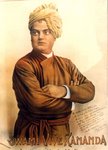Looking Beyond by Vivekananda
Most people cannot believe that there is something beyond, there is a divine spark present in us, and that undying divine light is our real essence.
We live in this little cage of flesh and bones, its cravings and comforts, and refuse to believe in anything higher or different from our present state of being. Imprisoned in the mire of stagnated living, we refuse to acknowledge the existence of anything deeper or subtler.
But such is the nature of life, the inherent design of life, that one cannot remain stagnated forever. However mired may be his feet in the dirt of finitude, man longs to emerge out. This is the reason why people seek to immortalize themselves through various ways. Some want to earn wealth, buy properties and want to leave a big bank balance behind. Some construct a building in their name. Some seek to perpetuate their memory through writing books or articles. There are only few, however, who understand that only by giving up their lower self can they gain or regain their blissful, immortal nature.
There are experiences which cannot be classified or restricted to our ordinary sensory experience. There are many areas in our life for which the usual cause and effect relationship does not provide a complete answer, but then, if we have failed to find the right explanations, why not for once listen to the testimony of Great Ones like Sri Ramakrishna, whose blazing life of spirituality can easily remove all doubts we have? Sri Ramakrishna lived spirituality. His words only conveyed what he lived. Take for example, his meeting with a Ramayat sadhu (a monk in the tradition of the worshippers of Sri Ramachandra) by name Jatadhari. For years, Jatadhari had carried with him the image of his beloved Ramalala. Wherever Jatadhari went, he took the small metal image of his Ramalala (infant Rama) with him and took care of it (or him?) as a living being. He bathed him, worshipped him, fed him, and put him to bed. Ramalala received the same attention as a child receives from his father.
When Jatadhari came to Dakshineswar, Sri Ramakrishna became acquainted with him and through him, with Ramalala. To Sri Ramakrishna's great delight, Ramalala responded to his worship as eagerly as he did to Jatadhari's. Sri Ramakrishna recalls:
`As the days passed, I felt that Ramlala loved me more and more. As long as I remained with Jatadhari, Ramlala was happy and playful. But whenever I left and went to my own room, he followed me there at once. He wouldn't remain with Jatadhari, even though I ordered him not to come with me. I thought at first that this must be an illusion. For how could the deity whom Jatadhari had worshipped for so long with such devotion love me more than him? But it was not my imagination.
I actually saw Ramlala as I see you—now dancing ahead of me, now following me. Sometimes he insisted on being taken on my lap. But then when I picked him up, he wouldn't want to stay there. He would run around in the sun, plucking flowers among the thorns, or splashing and swimming in the Ganges. I told him over and over again: `Don't do that, my child. You'll get blisters on the soles of your feet if you run in the sun. You'll catch cold and fever if you stay in the water so long.' But he never listened to my words, however much I warned him. He'd go right on with his pranks. Sometimes he'd look at me sweetly with his beautiful eyes, or he'd pout and make faces at me. Then I'd get really angry and scold him. `Just you wait, you rascal,' I'd tell him, `I'll give you a big thrashing today. I'll pound your bones into powder.' I'd pull him out of the water or the sun and try to tempt him with some gift to stay and play inside the room. If he went on being naughty, I'd give him a couple of slaps. But when I did that he'd pout and look at me with tears in his eyes, and I'd feel such pain that I'd take him on my lap and comfort him. All these things actually happened.'4
It may be difficult to believe this narrative, especially for a person stuck in the world of senses, but Sri Ramakrishna's testimony vindicates what countless saints and mystics over the millennia have believed and experienced—the living presence of God in their lives. God is. No arguments needed.


